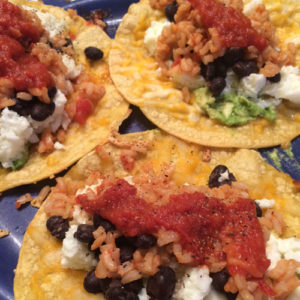“Inclusion isn’t just the right thing to do, it’s the smart thing to do”
Have you ever done Strengths Finder? In a non-certified nutshell, it’s a program that uses a series of questions to gauge a person’s top “themes” aka, areas of greatest strength. Companies often have employees go through the program to better understand where they shine, help them work better as teams, and help managers better manage based on people’s unique strengths.

Life is the best when everyone is included
In my top three strengths is the theme, Includer. Again, in an “I’m-not-certified-so-I-only-know-the-basics” nutshell, it means when I’m in a group setting, I proactively make an effort to ensure everyone feels included. This theme is one I definitely feel fits me. I always hated feeling left out of anything when I was younger so it’s important to me that no one else ever feels like they’re not being included.
I realized this inclusive trait extends to other areas of my life – one in particular, eating. Not shocking to anyone who reads the blog or follows my social accounts, I love food. More than that, I’m a fan of inclusive diets vs. those that deem you can’t eat certain foods.
I know, I know – this idea of inclusive eating probably sounds really bizarre coming from someone who voluntarily excludes a major group of foods from her daily diet. Yes, I’m a vegetarian. No, I don’t exclude meat because I think it’s bad or I shouldn’t eat it. I simply don’t like it; never really have. I wish I did though; I would totally mooch off my husband’s stellar meal prepping skills.
Anyway, back to diets. I think most people have tried a diet or two in their lifetime that comes with rules of certain foods you can’t eat. As in life, here’s why I feel an inclusive approach to eating is best.
1. Variety is the Spice of Life
Unless you’re allergic, intolerant, or simply don’t like something, there’s no reason you should have to exclude anything from your diet. Opening yourself up to all possibilities keeps things interesting, plus, you might find some new, healthy food combos that you really enjoy.
And, not only does restrictive eating get mundane, depending on how restrictive it is, it might be really hard to maintain IRL. Raw veggies and meat only might sound like a great idea in theory but it’s also really tough to exclude all the other foods – both from a convenience and willpower standpoint.
2. Nutrition
Speaking of high-restrictive, omitting certain foods could leave you lacking in nutrients. Most restrictive diets do just that – restrict. Whether dairy, carbs, gluten (which, p.s. is not a diet but too many people treat it like one), or fruit is off-limits, the body ends up missing out on the natural goodness found in those foods.

Not a perfect meal but lots of good, tasty stuff in here
Supplements are an option but typically the body doesn’t absorb the nutrients as well as it does if it were actual food. As someone who has tried really hard to make up for lack of protein with powders, bars, even beans and legumes, trust me, I know – it’s not quite the same as the protein power that comes from animal meat. Sigh.
3. Screw Deprivation
Ice cream. Skittles. Cheetos. While one could argue there is zero nutritional value to these foods and they should therefore be excluded from a healthy diet, I disagree. There’s nothing wrong with enjoying a treat every now and then – even if it is a zero-nutrition, sugar-filled, empty-calorie donut. Mmmm, donuts. If you want the donut, have it! Then get over it and get back to the good stuff at your next meals. Deprive yourself too long and it could be a quick train ride to binge-city.
Plus, by labeling some foods as “forbidden” the desire to eat them might grow and you’ll feel awful about yourself when you indulge when, really, it’s okay. Again, move on and eat something better at your next meal.
4. Being Social
Take it from a vegetarian – when your diet doesn’t include a common, popular type of food, social settings where food is involved can be tough to navigate. Many times, my “dinner” has consisted of a hotdog bun with cheese because there was nothing else for me to eat. The upside, I wasn’t staring at the hotdogs and hamburgers, wishing I could have one.
A restrictive diet can be tough in social situations as much as personal ones. Not saying it can’t be done; I’ve been handling them for years (often resorting to packing my own food or at least ensuring I have a Quest bar and apple in my purse). But if you can avoid it and just enjoy yourself, that’s gotta be much more pleasant than having food FOMO.
5. Eat to Live
Finally, let’s be real for a sec and remember the true purpose of food. It’s meant to fuel our bodies to do great things, whether that’s curing cancer, running a marathon, or getting a two-year-old dressed and off to daycare without incident.

Jimmy Johns – fueling my marathons and long runs for years
Restricting foods gets us back to the relationship where we associate food with being “bad” and making us “fat” meaning we, as humans, must be bad and fat people when we want to eat. I’d like to close by throwing it back to a blog I wrote around the holidays a couple years ago and remind you: Food isn’t bad. You’re not bad.
Now that I’ve put that out there, I want to see this from the other side. Do you believe in restrictive diets? What benefits have you personally seen from one? Comment or tweet me @LindsayIRL. Share photos of your healthy food choices on Instagram and Twitter using hasthtag #wellirl.
